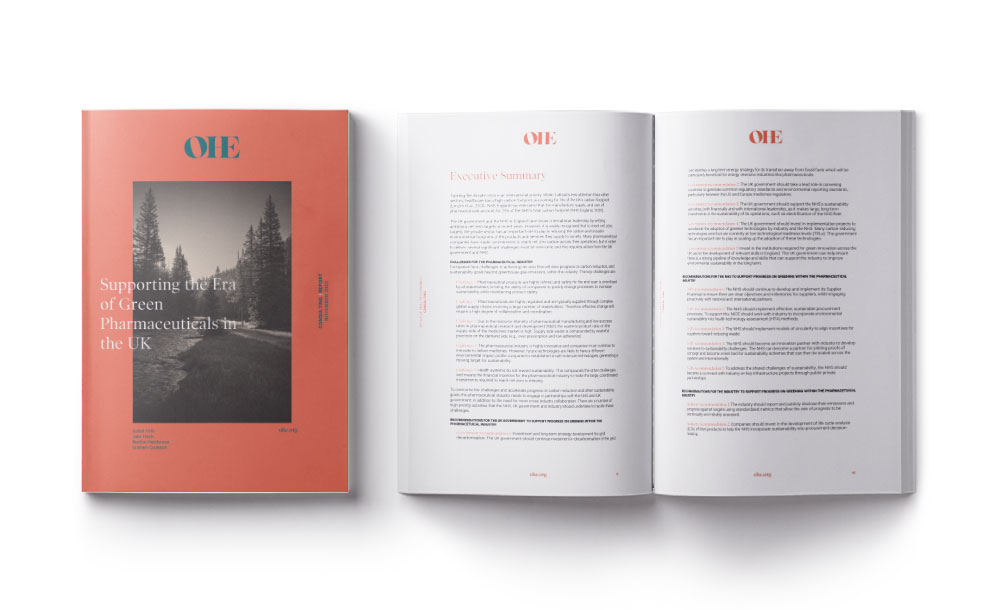Sustainability in the pharmaceutical industry

Sustainability is at the heart of the pharmaceutical industry’s day-to-day operations, with many skilled individuals working in sustainability roles. We are starting to see initiatives from companies all across the world, from investment in renewables, to low-carbon inhalers, to net zero buildings, and some examples are featured here, demonstrating their commitment to tackling the challenges in building a greener pharmaceutical industry in the UK.
We’re working with Government, NHS and other partners to drive forward progress, and as a global industry with global supply chains, our members are acting in partnership with other regions to create lasting change.
What are Scope 1, 2 and 3 emissions?
Greenhouse gas emissions are categorised into three groups or 'scopes' by the most widely-used international accounting tool, the Greenhouse Gas (GHG) Protocol.
Scope 1 covers emissions that a company makes directly – for example while running its boilers and vehicles. Pharmaceutical companies are reducing Scope 1 emissions, for example by generating their own renewable energy, moving to electric vehicles and changing their international distribution networks to minimise emissions.
Scope 2 emissions cover those that the company makes indirectly – like when the electricity it uses, is produced on its behalf by a different company. Pharmaceutical companies are reducing Scope 2 emissions, by switching to renewable energy suppliers. Some either run completely on renewable energy or are working towards it.
Scope 3 emissions cover those are not generated by the company itself, but by any organisation or person they are indirectly responsible for. For example, Scope 3 emissions cover those generated from the suppliers of the components used to make medicines, the transport of raw materials and those generated by people using the pharmaceutical company’s products.
To tackle Scope 3 emissions, many companies are looking at the entire life-cycle of the way they manufacture medicines.
By reformulating medicines so they can be manufactured in a more environmentally friendly way, companies are reducing carbon emissions, saving water and waste and reducing the total environmental impact of what they do.
The NHS has set out an ambitious plan to become the world’s first Net Zero National Health Service. The NHS estimates that the use of medicines account for 25% of total emissions from the health service, it is critical that industry and the NHS work together to develop solutions that support this ambition.
The ABPI has committed to support our members towards delivering the NHS net zero goals.
As global businesses recognising that climate change is a global concern, pharmaceutical companies are taking action at a global level.
Many are setting targets according to the Science Based Targets Initiative, which provides companies with a clearly-defined path to reduce emissions in line with the Paris Agreement goals - limiting global warming to well-below 2°C above pre-industrial levels and pursuing efforts to limit warming to 1.5°C.
Our industry recognises the need to conserve water, particularly with climate change making water availability less predictable in many places.
For industry, responsible water management means using water efficiently and safely throughout the lifecycle of products, including in their supply chain. It also means helping to preserve water quality by preventing pharmaceuticals entering water courses like rivers.
This mainly happens as a result of excretions from patients being treated with the medicines and improper disposal of unused or expired medicine. Relatively small quantities come from drug manufacturing effluents and R&D facilities.
Pharmaceutical companies are committed to reducing operational waste from their sites, as well as reducing waste from the packaging of products. This can involve increasing recycling, replacing paper-based patient information leaflets with online versions, and increasing the recycled content in packaging.
Reducing waste from packaging is one of the biggest challenges our industry faces, and industry is working to solve it by working with regulators and Governments, and investing in research and new technologies.
Pharmaceutical companies are using green chemistry principles and changing the way they manufacture products to reduce the total environmental impact of creating medicines.
This can often mean reduce carbon emissions, saving water and cutting waste all at the same time.

Paving the way to sustainability: transforming pharmaceutical industry practices
Roz Bekker, Managing Director Janssen UK & Ireland, ABPI Sustainability Board Sponsor
Recycling pharmaceutical packaging
Despite the importance of eco-friendly packaging, changing the packaging of existing medicines to make them easier to recycle involves complex regulatory approvals.


Supporting the era of green pharmaceuticals in the UK
To overcome the challenges and accelerate progress on carbon reduction and other sustainability goals, the pharmaceutical industry needs to engage in partnerships with the NHS and UK government, in addition to the need for more cross-industry collaboration. There are a number of high-priority activities that the NHS, UK government and industry should undertake to tackle these challenges.